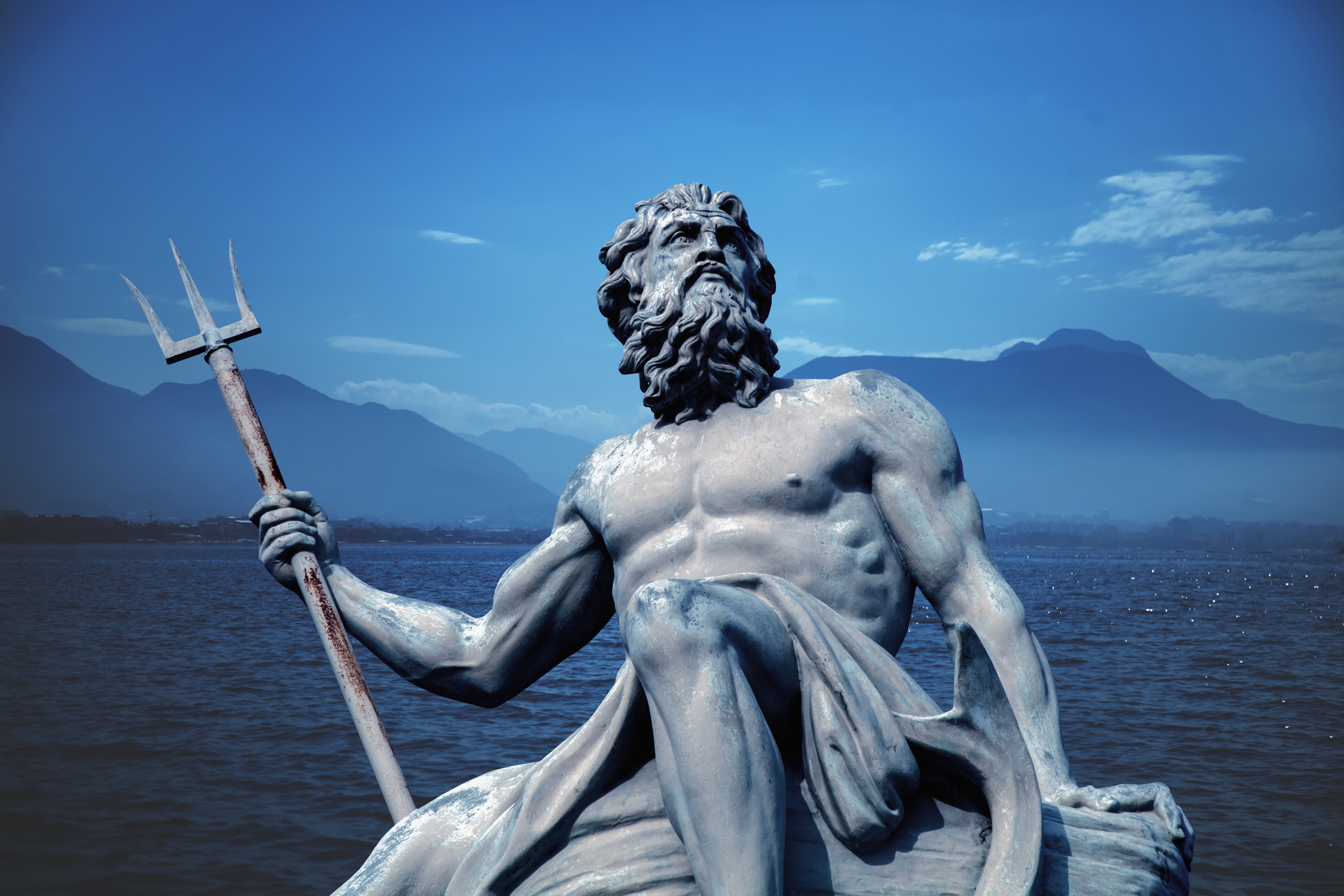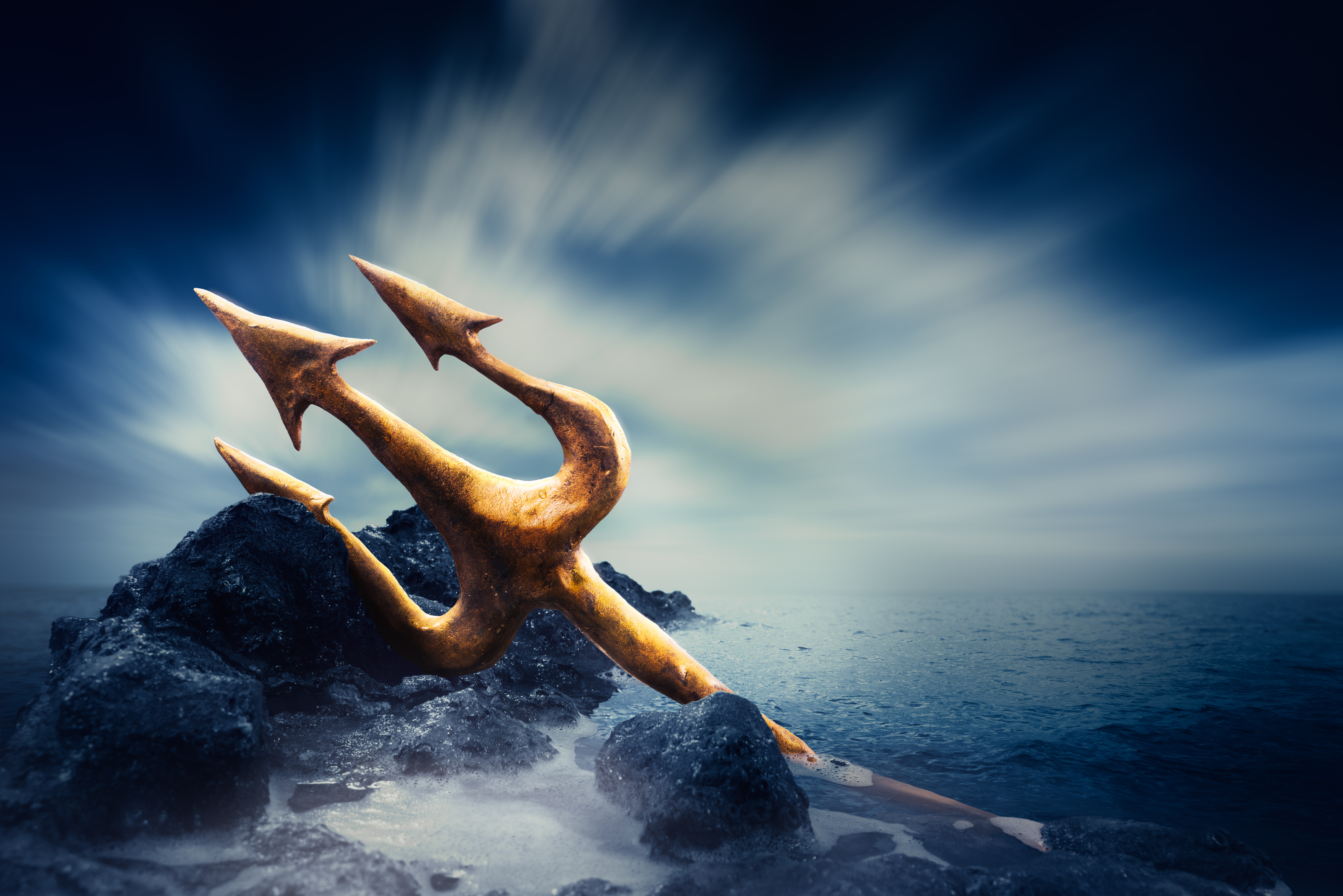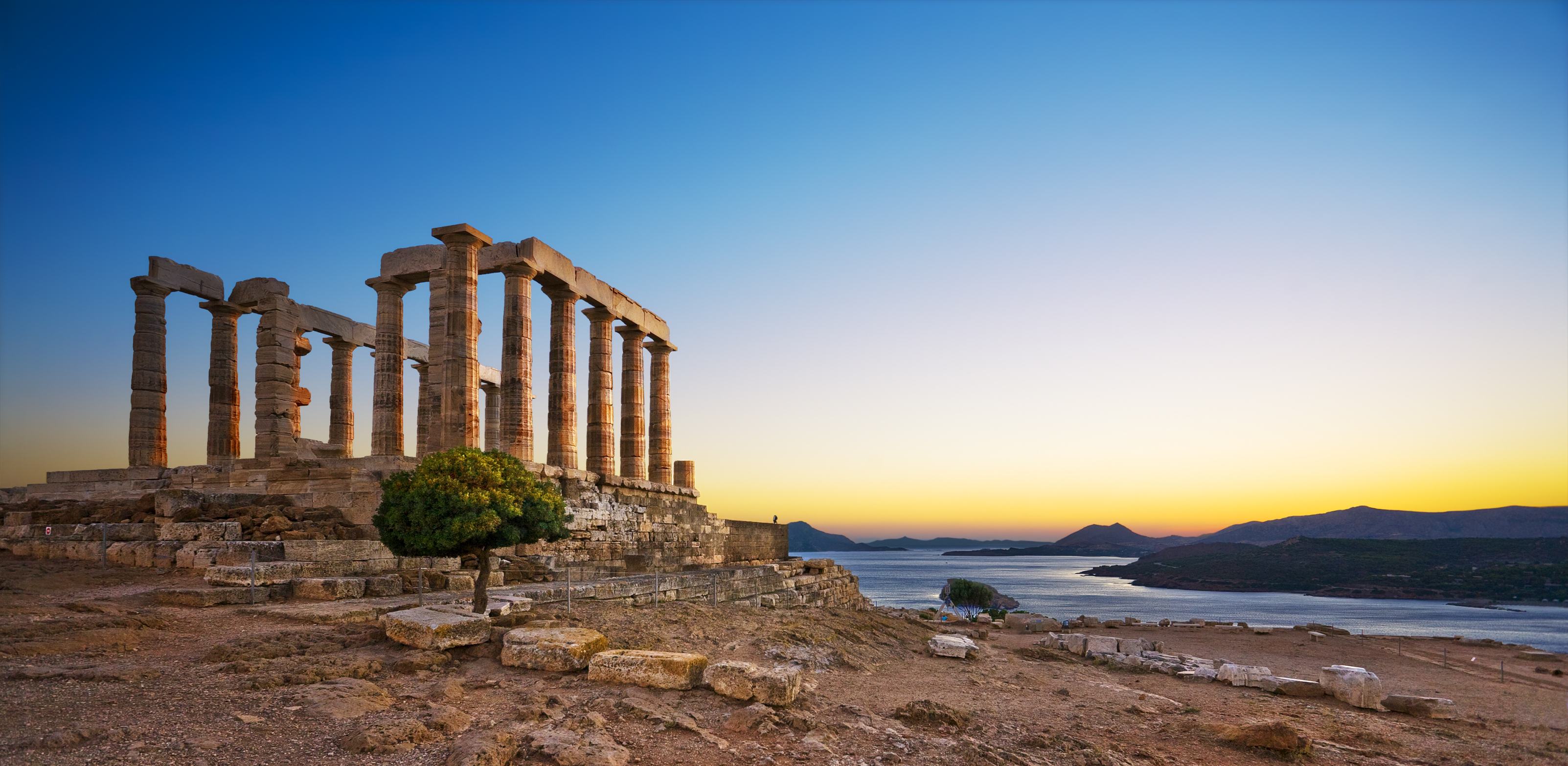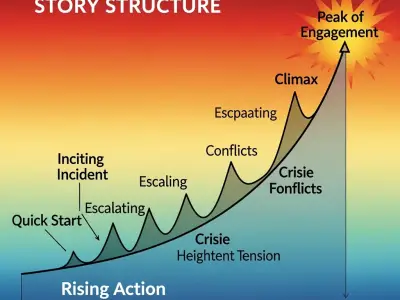Poseidon stands out as a figure of immense power and complexity among the Greek gods. Known primarily as the god of the sea, his influence extends far beyond the ocean's depths, touching upon earthquakes, storms, and even horses. This blog post delves into the myths, powers, and family tree of Poseidon, offering insights into his role in Greek mythology.
Jump to:
Who is Poseidon?

Poseidon is one of the twelve Olympian deities in Greek mythology, ruling over the seas and waters. With his mighty trident, he could stir the waters to his will, cause storms, and even trigger earthquakes, earning him the title "Earth-Shaker." His domain was a world as temperamental and vast as the sea, reflecting his dual nature of benevolence and wrath.
Poseidon's Powers and Symbols
Let’s delve into Poseidon's divine authority and explore the symbols and abilities that made him a powerful and fearsome deity in Greek mythology.
- Dominion Over the Aquatic Realm: Poseidon's connection to all aspects of the sea and its boundless mysteries highlights his role as a ruler of the seas. His dominion encompasses the entire aquatic spectrum, from the calmest pond to the most turbulent ocean depths.
- Control Over Water: Poseidon's ability to control water in all its forms illustrates a deep bond with the element, allowing him to summon storms, calm the seas, and even create springs. This showcases the unpredictable nature of his powers, much like the sea itself.
- Earthquakes and Storms: As the deity responsible for earthquakes and storms, Poseidon's influence extends into the skies, wielding the power to bring bounty or devastation through his temperamental will.
- The Trident: This three-pronged spear symbolises Poseidon's might and ability to exert his will upon the world. It represents his power to stir the oceans, invoke seismic tremors, and manipulate water sources, embodying his roles as destroyer and creator.
- Association with Horses: Poseidon's connection to horses symbolises freedom, power, and the unrestrained forces of nature. Considered the creator of these noble creatures, he embodies the spirit of the boundless sea and the untamed horse, showcasing his ability to summon or craft horses from the waves, highlighting his benevolence and awe-inspiring power.
The Family Tree of Poseidon
Born to Cronus, the Titan king, and Rhea, his queen, Poseidon was part of a distinguished lineage that would dominate the ancient Greek pantheon. His brothers, Zeus, the king of gods, and Hades, the ruler of the underworld, and Poseidon, formed a trio that governed the cosmos, each ruling over their respective realms with absolute authority.
Amphitrite, a sea nymph who embodied the sea's serene and nurturing qualities, became Poseidon's wife and consort. Their union was celebrated across the oceans, symbolising the harmonisation of the sea's mighty and tranquil aspects. Their son Triton inherited his father's domain, often depicted as a merman heralding the god's will with a blow of his conch shell.
Poseidon's romantic entanglements further entwined his legacy with the mortal and divine worlds. Among his children were Triton, the messenger of the sea; Polyphemus, the cyclops blinded by Odysseus; and Pegasus, the winged horse born from the blood of Medusa. Each offspring represents different facets of Poseidon's influence—Triton's heralding of the sea's might, Polyphemus' embodiment of the untamed, formidable aspects of nature, and Pegasus' symbolisation of the intersection between the divine and the heroic.
Myths Surrounding Poseidon

Numerous myths showcase Poseidon's influence and character:
The Contest for Athens
One of the standout tales about Poseidon's role in divine and human matters is his contest with Athena to become the protector of Athens. In an attempt to win the favour of the Athenians, Poseidon struck the ground of the Acropolis with his trident, from which a saltwater spring emerged. This act symbolised his offer of naval power and control over the seas.
On the other hand, Athena presented the olive tree as a symbol of peace, prosperity, and agricultural abundance. The Athenians deemed Athena's gift more beneficial and awarded her the city's patronage. The mark of Poseidon's trident on the Acropolis serves as a reminder of this contest and the impact of the gods on the human world.
Poseidon's Role in the Trojan War
In the epic saga of the Trojan War, Poseidon's participation reveals his complex nature and divine politics. Initially, Poseidon allied with the Greeks, motivated by a shared enmity towards Troy and its people. However, his support wavered due to Agamemnon's arrogance and the mistreatment of Achilles, reflecting the god's sensitivity to honour and respect.
Poseidon's influence was pivotal, shaping the war's course through divine intervention and his mastery over earthquakes, horses, and the sea. It demonstrated the breadth of his power and his interest in the affairs of mortals.
The Creation of the Minotaur
Another of Poseidon's tales involves the creation of the Minotaur, a creature with the body of a man and the head of a bull. The myth begins with King Minos of Crete, who prayed to Poseidon for a sign to legitimise his rule. Poseidon sent a magnificent white bull, expecting Minos to sacrifice it in his honour.
However, struck by the bull's beauty, Minos kept it and sacrificed another bull in its place. Angered by this deceit, Poseidon caused Minos's wife, Pasiphaë, to fall in love with the white bull. The union of Pasiphaë and the bull resulted in the birth of the Minotaur, a symbol of Poseidon's wrath and a reminder of the consequences of failing to honour promises to the gods.
Poseidon and the Wall of Troy
Poseidon's contribution to the building of the walls of Troy is a testament to his role as a builder and shaper of cities. Alongside Apollo, he was compelled to serve King Laomedon of Troy as punishment from Zeus. Poseidon and Apollo built walls that would make Troy famous for its strength. However, when Laomedon refused to pay them for their divine labour, Poseidon sent a sea monster to ravage the Trojan coast as retribution.
Poseidon and Demeter's Quest
In a lesser-known myth, Poseidon pursued Demeter, the goddess of agriculture and fertility. To escape his advances, Demeter transformed herself into a mare and mingled with the herds of Arcadia. However, Poseidon discovered her disguise and transformed himself into a stallion.
He caught her, resulting in the birth of Despoina, a goddess, and Arion, a horse with the power of speech. This myth illustrates Poseidon's connection to horses and his relentless pursuit of desires. It also reflects the interwoven destinies and powers of the Olympian deities.
Poseidon's Love Affairs and Rivalries
Poseidon's romantic entanglements and conflicts spanned the realms of gods and mortals. They were fraught with drama and often had significant repercussions in the mythical world.
- With Medusa: The liaison between Poseidon and Medusa is one of the most infamous, ending in tragedy. Medusa, originally a beautiful mortal, was transformed into a Gorgon by Athena after Poseidon was intimate with her in Athena's temple. This encounter highlights the intertwining of desire, divine retribution, and mortal suffering.
- With Amphitrite: Poseidon's courtship of Amphitrite, a Nereid nymph who became his wife, underscores his persistence and the allure of the sea. After initially fleeing his advances, Amphitrite was persuaded by the dolphin Delphin to accept Poseidon, symbolising the ocean's capacity for persuasion and dominion.
- Rivalry with Athena: Beyond love affairs, Poseidon's rivalry with Athena for the patronage of Athens showcases the competitive nature of divine relationships. This contest, ending in Athena's victory, emphasises the gods' direct influence on the founding and protection of cities.
- With Demeter: Poseidon's pursuit of Demeter, resulting in the creation of the horse, reflects his multifaceted nature. Demeter's transformation into a mare to avoid Poseidon, and his subsequent disguise as a stallion, symbolise the primal forces and transformative powers at play in their divine interactions.
- With Alope: Poseidon's affair with Alope, a mortal woman, resulted in the birth of a son, Hippothoon. Alope's tragic fate, transformed into a spring by her father's harsh punishment, and Poseidon's vengeance against him illustrate the interplay between divine justice and mortal cruelty.
- Rivalry with Zeus and Hades: Poseidon's relationships with Zeus and Hades were complex, marked by cooperation and conflict. As brothers ruling different domains (the sky, the underworld, and the sea), their shared lineage and division of power after the Titanomachy highlight the delicate balance within the Olympian hierarchy.
- With Coronis: Poseidon's union with Coronis, a Lapith woman, led to the birth of the charioteer Idas. This affair underscores Poseidon's role in the genealogy of heroes and his influence over various aspects of Greek mythology, from heroism to the mastery of horses.
Poseidon's Legacy
Poseidon's legacy in Greek mythology is a testament to the human fascination with the sea and its mysteries. His stories convey themes of power, passion, and the delicate balance between creation and destruction, mirroring the unpredictable nature of the waters he ruled. Poseidon reminds us of the awe-inspiring and sometimes fearsome elements that exist beyond human control yet are integral to the world.
Temples Dedicated to Poseidon

The ancient Greeks built magnificent temples to honour Poseidon, reflecting his importance. The Temple of Poseidon at Sounion, perched majestically on a cliff overlooking the Aegean Sea, is among the most iconic. This temple was a landmark for sailors, symbolising a prayer for safe passage and a testament to Poseidon's power. Other notable sites include the temples in Athens and other parts of Greece, where rituals and offerings were made to appease the god of the seas.
Common Questions About Poseidon
What are Poseidon's primary domains and responsibilities?
Poseidon is predominantly known as the god of the sea, controlling all aspects of the ocean, from its calmest waters to its most turbulent storms. Beyond his aquatic powers, he also governs earthquakes and is associated with horses, symbolising power and freedom.
How did Poseidon express his powers?
Poseidon wielded his mighty trident to stir the seas, summon storms, create springs, and cause earthquakes. This trident is a symbol of his dominion over water and his ability to both create and destroy.
Is Poseidon only connected to negative aspects like storms and earthquakes?
While Poseidon's temper could invoke storms and earthquakes, he also had a benevolent side. He created horses, demonstrating his connection to freedom and power, and could provide calm seas and freshwater springs.
What is the significance of Poseidon's trident?
Poseidon's trident is a powerful symbol representing his ability to control the sea, invoke earthquakes, and manipulate water. It signifies his sovereignty over both creation and destruction within his domains.
How does Poseidon interact with other deities and humans?
Poseidon's interactions are complex; he could be both an ally and an adversary. His support or wrath towards humans and gods often depended on respect shown towards him and the fulfilment of promises made to him.
Did Poseidon have any rivals?
Poseidon had rivalries with gods and humans, often stemming from contests of power or honour. His rivalry with Athena over the patronage of Athens is one of the most famous examples.
What does Poseidon's family tree reveal about his influence?
Poseidon's extensive family tree, including his wife Amphitrite, his son Triton, and various other divine and monstrous offspring, highlights his influence across the realms of gods, humans, and creatures, reflecting the breadth of his powers and passions.
How does Poseidon's mythology impact the understanding of ancient Greek culture?
Poseidon's myths offer insights into the ancient Greeks' views on the power of nature, the divine, and the interconnectedness of the world. His stories reflect the respect and fear the Greeks held for the sea and natural phenomena, embodying their beliefs in the gods' active involvement in the natural and human worlds.
Can Poseidon be considered a protector or a destroyer?
Poseidon embodies the dual roles of protector and destroyer, reflecting the sea's nature. He could provide safe passage and bountiful resources or unleash devastating storms and earthquakes, depending on his disposition and the respect shown by mortals.
Recommended for you!
Best SellersDiscover Greek Mythology With Centre of Excellence
Dive into the captivating world of Greek mythology with our Greek Mythology Diploma Course, crafted to illuminate the tales, deities, and heroes of ancient Greek heritage.
Why Centre of Excellence?
- Accessibility: We believe everyone should have access to education. That’s why our courses are affordable, making the wonders of Greek mythology accessible to everyone.
- Flexibility: Our courses are designed to blend with your life seamlessly. Learn at your own pace, whenever and wherever suits you best, bringing ancient wisdom into your modern schedule.
- Diverse Curriculum: Our course delves deep into the myths, gods, and heroes, catering to a broad spectrum of interests and sparking a lifelong curiosity about ancient cultures.
- Supportive Community: Enrolment means joining a community of like-minded learners and receiving personalised support from our tutors, ensuring you're supported throughout your educational journey.
Special Invitation
Embark on an epic journey through ancient Greek culture with our Greek Mythology Diploma Course, exclusively priced at just £29 when you follow the link above.












